A peaceful protest march and a Webinar focus on an old injustice that has not ended.
by Marco Respinti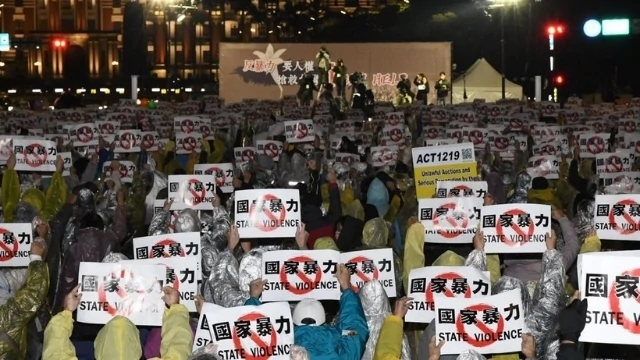
The street demonstration of December 19, 2020.
It was December 19, 1996. Ms. Wang Li-Xiang, a Taiwanese housewife, went to the Tai Ji Men Academy as usual. Tai Ji Men is a menpai (similar to a “school”) teaching Qigong and martial arts, rooted in esoteric Taoism. Wang’s husband had found the Academy a place where to improve his health condition, after he had been injured during military service. Ms. Wang saw brawny men who claimed to be from the prosecutorial and investigation agencies rushing through the Academy, and later her husband, Mr. Lin, was taken away by men with loaded guns. As it happened to other dizi (disciples) of Tai Ji Men, Lin was accused of belonging to a fraudulent group and later interrogated, in June 1997, in an aggressive way by the man who was behind the crackdown on Tai Ji Men, Prosecutor Hou Kuan-Jen. Like all the other dizi, Lin was eventually found innocent of all charges. But his reputation had been ruined, as well as his health, leading him to a premature death.
On December 19, 1996, Mr. Guan Ming-Sheng had a similar traumatic experience. He went to the Academy to pick up his wife, only to find she had disappeared, and the leader and some dizi of Tai Ji Men were being escorted at gunpoint in the street to the Taipei City Field Office of the Investigation Bureau, which was 500 meters away. Guan’s wife eventually returned home, after eight hours of interrogation, but her picture appeared in the media, causing problems that lasted for years to her and her family.
The Grand Master (Shifu) of Tai Ji Men, Dr. Hong Tao-Tze, was arrested on December 19. Ms. Huang Li-Jung, an attorney, went to the detention center to see one of her clients, and happened to see Dr. Hong. She later realized that he was detained in inhumane conditions. He was held in damp, cold cells. Attorney Huang reported that a comfortable brand-new quilt was sent to the detention center for Dr. Hong, but it was replaced it with an old, dirty one, which they suspected had been manipulated in such a way that it made Hong’s whole body so itchy that he would scratch and break his skin. Eventually, his feet became so swollen and painful that he could hardly walk. There were concerns his feet would need to be amputated. Yet, a request for medical parole was ignored by Prosecutor Hou, although later the District Court judge in charge released him on bail.
Testimonies on December 19, 1996.
Wang, Guan, and Huang were among those who testified during a Webinar organized on December 20 by CESNUR, the Center for Studies on New Religions and the publisher of Bitter Winter, and the Brussels-based NGO Human Rights Without Frontiers, where I was asked to comment on their testimonies, and videos were also presented. The Webinar followed a peaceful street demonstration in Taipei on December 19, where some 10,000 citizens commemorated the anniversary of the 1996 events. They also marched for tax justice. In fact, Dr. Hong and his co-defendants were all acquitted from the criminal charges, there was not tax owed, and the defendants who were detained even received national compensation for their wrongful detention, but as a by-product of Hou’s failed prosecution, tax cases for an alleged and non-existing tax evasion—a charge which should have been revoked, according to the decision of Taiwan’s Supreme Court of July 13, 2007—continued. 13 years later, the Tax Bureau still claimed that Dr. Hong owed business taxes and other related taxes, as well as the consolidated income tax for 1992. In August 2020, properties belonging to Dr. Hong were auctioned and, when the auction failed, seized by the authorities, even after the Supreme Administrative Court had repeatedly ruled in favor of Tai Ji Men, and Dr. Hong did not owe any tax.
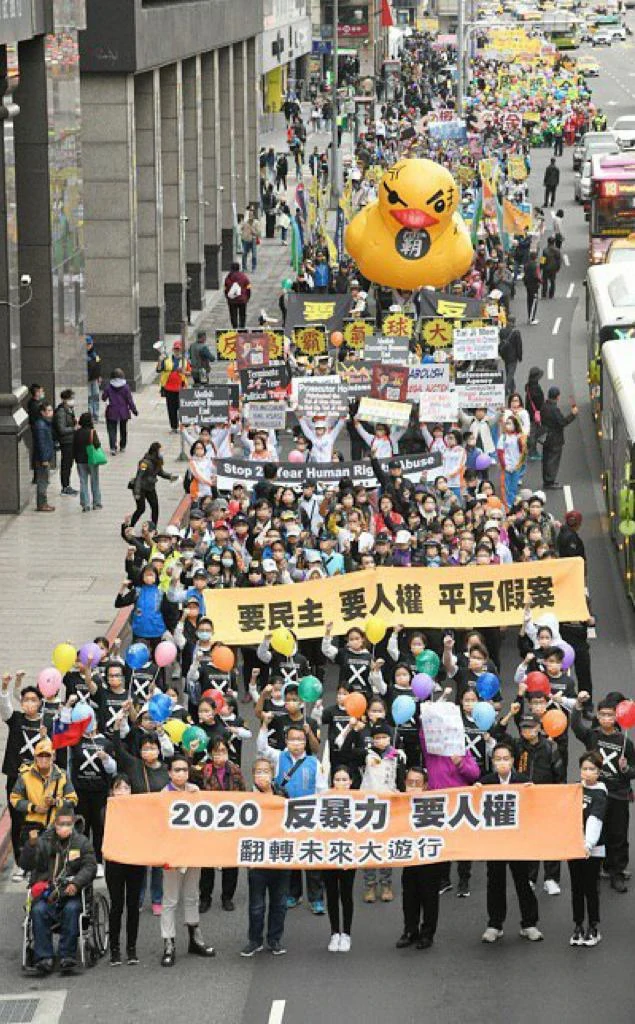
The street demonstration. The rubber duck is a traditional symbol of protest in Taiwan.
The protesters claimed that, starting from 1996 till December 18, 2020, in the Tai Ji Men case, Taiwanese government officials violated 169 articles of 34 types of law provisions, but no government official was punished. After analyzing 16,153 articles of 226 types of law provisions, scholars found that only 122 articles (0.76 %) can be used to punish government officials, while 1,299 articles (8.04%) can be used to punish civilians. The protesters displayed one paper roll, 9.6 meters long, featuring the law provisions that can be invoked to punish the bureaucrats’ wrongdoings, and six paper rolls, each 21 meters long, for a total of 126 meters, featuring the provisions used against civilians.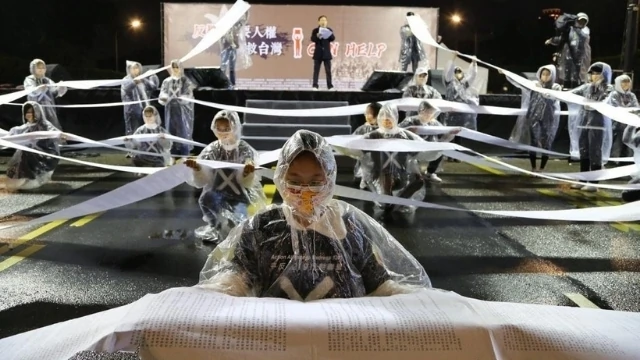
The paper rolls.
Some protesters were dressed as ATMs, to claim that taxpayers are not merely ATMs for the government. Other protesters enacted mock attacks on them, symbolizing the greediness of the bureaucrats.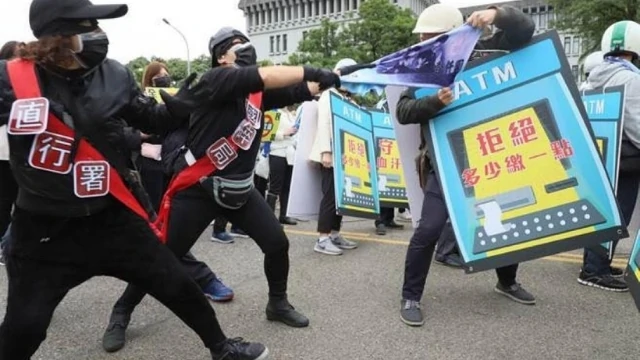
Protesters enact a mock attack on the human ATMs.
Young dizi such as Shelly Tu, an accountant, and Chang Shu-Ying, a counseling teacher, participated in the protest and told their stories at the Webinar. They were particularly incensed by the fact that, while one of the bodies that in Taiwan oversees abuse by public officers, the Control Yuan, had completed the investigation and sent the case to the Ministry of Justice for it to take disciplinary action against Prosecutor Hou, actually Hou was never sanctioned and has even been promoted to deputy director-general of the national anti-corruption agency. And the bureaucrats who presided over the illegal tax enforcement against Dr. Hong got a monetary bonus.
The protest of December 19, 2020.
Professor Pier Marco Ferraresi, an economist from the University of Turin, Italy, expressed his “astonishment” as a specialist of public economy for the misuse of tax laws to persecute a spiritual minority. He noted that “tax persecution” is more difficult to be corrected than any other form of persecution, because it generates an “administrative inertia” that can feed itself for years, and is more difficult to understand for human rights NGOs and the general public, because it involves complicated technical issues.
Several religious movements were the victims in 1996 of crackdowns against spiritual movements accused of not supporting the political party who won in that year the first direct presidential election in Taiwan. Even if it had not taken a political stand, Tai Ji Men ended up being the group persecuted for the longest period, because it fought vigorously against the accusations, particularly of tax evasions, always refusing any settlement.
Prosecutor Hou also developed a personal vendetta against Hong and Tai Ji Men. Massimo Introvigne, Bitter Winter’s editor-in-chief, discussed the bizarre accusation of “raising goblins” Hou directed against Hong. As “evidence” of his accusation, Hou presented to the media (but never to the court) a peach wood sword, actually a gift given by Ms. Cheng Tsui-Yu, a dizi, to Dr. Hong, and a commemorative work of art totally unrelated to goblins. Ms. Cheng was the grandmother of Mr. Liu Tao-yuan, who also testified in the Webinar, telling the story of how his family suffered for years because of the incident. Human rights attorney Alessandro Amicarelli examined how Hou created a false “self-help” organization of alleged “victims” of Tai Ji Men, later exposed as a fraud by the criminal court and Control Yuan. Hou failed to fulfill his duty to investigate the self-help organization.
Full video of the Webinar
Camelia Marin, deputy director of the NGO Soteria International, who served as host of the event, and Peter Zoehrer, a well-known Austrian journalist and executive director of FOREF (Forum for Religious Freedom Europe) noted one of the reasons why the Tai Ji Men case is so important. Taxes are increasingly used or, rather, misused to discriminate against spiritual minorities governments, for whatever reason, do not like. Zoehrer offered a comparison with the case of Reverend Moon Sun-Myung, the founder of the Unification Church, who was imprisoned in the United States for thirteen months in 1984–85, accused of tax evasion. Many organizations, some far away religiously and politically from the ideas of Reverend Moon, protested his imprisonment, and denounced it as politically motivated and a threat to religious liberty, just as it happened twelve years thereafter with the case of Dr. Hong.
Concluding the Webinar, Willy Fautré, director and co-founder of Human Rights Without Frontiers, noted how the same pattern of intolerance repeats itself against a variety of minority spiritual movements throughout the world. It rests on two pillars, false accusations, and media campaigns. The latter may create human tragedies. Some of the witnesses reported that there were dizi who lost their jobs, and both their children and their old parents were insulted in the streets by people accusing them of “raising goblins,” after Prosecutor Hou created the corresponding story. It may seem that taxes are but a minor part of these tragedies, Fautré said. But his long experience in defending religious liberty in several different countries taught him that this is not the case. Tax injustice is a component of a larger system of injustice that should not be overlooked or condoned.
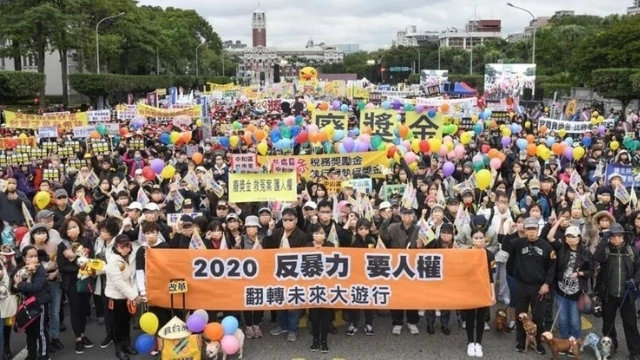
The crowd at the December 19, 2020 protest.
Source: Bitter
